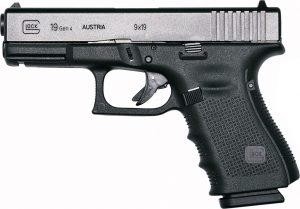While the Second Amendment to the United States Constitution gives citizens the right to bear arms, i.e., own guns, there are many federal regulations and state laws that apply to gun ownership. There are many laws in place that criminalize certain gun activity, and an individual who is caught by law enforcement engaging in illegal gun activity could face severe punishment. There are many times when a criminal defendant finds him or herself facing gun charges in Massachusetts. Anyone who has been charged with a gun offense or other weapons offense needs to consult with an experienced Massachusetts criminal defense lawyer immediately. Continue Reading
Articles Posted in Firearm Offenses
When Women Unwittingly Supply or Hold Guns
An unfortunate scenario that often lands women in trouble with the law is when they unwittingly become involved in the illegal holding, supplying, or trafficking of weapons to those who are not permitted by law to have them. Many women find themselves pressured by family members, husbands, boyfriends, etc. to serve as a straw purchaser, someone who buys a gun or other weapon on behalf of someone else who is unable to purchase the gun or weapon themselves. If you supply or hold guns you face serious criminal legal problems. Continue Reading
When Toy Guns Look Real, Confusion Ensues
Boston police have recently called for legislation to be put into place concerning toy and replica guns. Not only are BB guns and air rifles commonly used by teens to commit acts of vandalism such as the destruction of property. In light of the recent rash of highly publicized instances of police shooting innocent people and people starting to fire shots back at the police, law enforcement officers have been on high alert when it comes to identifying potential shooting threats. Since officers are on edge and are concerned about their safety while on the job, things can get very dangerous very quickly if an officer mistakes a toy gun for the real thing. When toy guns look real confusion ensues. Continue Reading
Involuntary Manslaughter Conviction for Fatal Asthma Attack
Early this month, a Boston man was convicted for involuntary manslaughter for the death of a victim who died from a fatal asthma attack, wbur.com reports. In January of 2012, Michael Stallings, 26 years old, instigated a shooting on a group of men, allegedly as an act of gang violence. While not a single bullet hit any of the men, the incident triggered an asthma attack in one of the men, Kelvin Rowell, age 40, as Rowell was fleeing from the perceived danger of the shots fired. Rowell was a bystander and not part of the alleged gang quarrel. Rowell was taken to the hospital where he stayed for over a month before he ultimately fell into a coma and died. Continue Reading
How to Defend Yourself Against the Possession of Firearms and Narcotics
Firearm laws are clearly defined and strictly enforced in Massachusetts. Anyone wanting to legally possess or carry a firearm must follow strict protocol and carry a firearm identification card, or FID. While gun violation penalties are serious, they are increasingly severe in the presence a controlled substance. If you find yourself facing charges involving both a firearm and controlled substance, contact a criminal defense attorney right away. This post examines how you might defend yourself against the possession of firearms and narcotics. Continue Reading
Massachusetts Gun Violations Attorney
Many people who are charged with gun possession crimes are not career criminals. Instead, they were in the wrong place at the wrong time or lacked understanding in complicated state firearm legislation. Consequences for weapons violations can be costly, both professionally and personally, but they can be avoided when armed with the right information, advice and representation by a Massachusetts gun violations attorney.
In the State of Massachusetts, a firearm identification card, or FID, is required to purchase or carry a weapon, as defined and specified by Massachusetts general law. A Class A FID permits the owner to carry a gun open or concealed, while a Class B license only permits open carry. Penalties for a violation conviction start at a mandatory one-year jail sentence and become increasingly severe if the weapon was in possession at the time of another crime, even if the crime was non-violent and did not involve a weapon. Such a conviction can also lead to the revoking of any weapons license. Also, despite the possession of an FID card, it is illegal to carry a weapon if the person is under the influence of drugs or alcohol, on school grounds, or in a secure area of the airport.
North Andover Drug Crimes Attorney Analyzes Methuen Drug Case
According to The Lawrence Eagle Tribune three Methuen Massachusetts people have been charged with trafficking more than thre-hundered grams of heroin, possession of a class A substance with intent to distribute and related gun offenses. The Tribune indicates that police responded to an apartment on Railroad Street in Methuen, MA due to a complaint of alleged domestic disturbance. Apparently, after the police entered the apartment they heard a “noise in the bedroom” and an occupant ran outside who was eventually apprehended and faces additionally charges of disorderly conduct and resisting arrest.
However, the authorities who stayed behind claim to have seen “in plain view” bags of heroin. Based on this observation the police applied for and apparently was granted a search warrant. Upon searching the apartment it appears that a substance believed to be heroin and two rifles were confiscated. The Tribune reports that in addition to the drug offenses three people are also facing charges for possession of a firearm without and FID card, illegal possession of a firearm without a license to carry, improper storage of a firearm, possession of a large capacity feeding device and unlawful possession of ammunition.
An aggressive and experienced defense attorney will carefully examine the circumstances surrounding the entry of the authorities into the apartment, into the bedroom and the alleged “plain view” observation of the alleged “heroin” in the “closet.” In Massachusetts, citizens have a reasonable expectation of privacy on their person and in their homes, Thus, the police cannot enter someone’s home without probable cause or consent. Although all of the facts of this case are not known at this time, if the police have been in the apartment or the bedroom it may be a situation in which a motion to suppress the entry into the apartment and evidence seized as a result of that entry.
A Legal Analysis Of The Relationship Between Standing And The Expectation of Privacy In The Context Of A Motion To Suppress
One of the most valuable tools that an aggressive and successful defense attorney has in his or her arsenal is the motion to suppress evidence. Whether a case is in the Lowell District Court, Peabody District Court or Lawrence District Court the viability of filing a motion to suppress evidence should always be considered when a client is charged with an offense in which the Commonwealth must prove possession to secure a conviction against a defendant. Boston area criminal Defense Our Attorney has successfully litigated motions to suppress evidence in the Massachusetts Superior and District Courts. Whenever a client is charged with possession of a controlled substance, possession of a controlled substance with intent to distribute, trafficking in a controlled substance, possession of a firearm, possession of ammunition or possession of a dangerous weapon a Massachusetts criminal defense attorney should consider filing a motion to suppress evidence. If a motion to suppress evidence is successful that is often the end of the case.
STANDING
In order to be in a position to file a motion to suppress a defendant must have standing and an expectation of privacy. Standing generally means that a person is legally in a position to file such a motion. Whenever a defendant is charged with an offense in which the Commonwealth must prove possession to convict a defendant, such as unlawful possession of a firearm, G.L. c. 269 § 10 9h), he has automatic standing to contest the reasonableness of the search under Article Fourteen of the Massachusetts Declaration of Rights. Commonwealth v. Amendola, 406 Mass. 592, 601 (1990) [adopting doctrine of “automatic standing” where defendant is charged with a possessory offense and seeks to exclude evidence under the Massachusetts Declaration of Rights]. Whether an individual has a reasonable expectation of privacy is usually a separate–but related issue. In Commonwealth v. Kirschner, 67 Mass. App. Ct. 836 (2006) the Appeals court recognized that a defendant charged with a possessory offense is relieved of the burden of showing an expectation of privacy. See, Commonwealth v. Frazier, 410 Mass. 235 (1991).
STANDING/EXPECTATION OF PRIVACY
Under the Fourth Amendment, the question of whether the defendant has standing to challenge a search or seizure is merged with the determination of whether the defendant had a reasonable expectation of privacy in the place searched, and a defendant has no standing if he has no reasonable expectation of privacy. Rakas v. Illinoi, 439 U.S. 128, 138-39 (1978); Commonwealth v. Mubdi, 456 Mass. 385, 391 (2010). In contrast, under Article Fourteen, the question of standing remains separate from the question of reasonable expectation of privacy. Mubdi, 456 Mass. at 391; Commonwealth v. Williams, 435 Mass. 203, 207-08 (2009); Commonwealth v. Frazier, 410 Mass. 235, 244 n. 3 (1991). “This separation matters most in cases where a defendant is charged with a possessory offense, because Article Fourteen gives a defendant automatic standing to challenge a search of a private place, such as an automobile or home, in which the object he is alleged to possess is found.” Mubdi, 456 Mass. at 392. Where a defendant has automatic standing, he does not need to show that he has a reasonable expectation of privacy in the place searched. Id. “The practical consequence of automatic standing is that, if a defendant is charged with illegally possessing drugs or firearms that were seized during a search, the defendant may succeed in suppressing such evidence where the search was unconstitutional, regardless of whether he has a subjective or objectively reasonable expectation of privacy in the place where the drugs or firearms were found.” Id. at 392-93.
Superior Court Judge Orders Suppression Of Gun And Related Evidence Following Motion To Suppress Evidence
If you are looking for an experienced and successful defense attorney for any drug crime, firearm offense or violent crime Our Attorney will bring good results and hard work to your case. She recently successfully litigated a motion to dismiss and suppress evidence in a Massachusetts Superior Court. The defendant was initially charged with being a career criminal, illegal possession of a firearm and improper storage of a firearm as the result of a search of a motor vehicle in which the defendant was a passenger. Our Attorney filed a number of pre-trial non-evidentiary motions including a motion to dismiss the career criminal portion of the indictment. She argued that the grand jury was not presented with the requisite number of previous offenses to charge the defendant as a career criminal. A superior court judge agreed and allowed the motion without a hearing. This eliminated the mandatory minimum state prison sentence that the defendant faced. This, however, was not the end of the case.
The defendant was still facing the illegal possession of a firearm charge that carried a mandatory committed sentence of eighteen months in jail if convicted. Our Attorney conducted a thorough pre-trial investigation and filed a motion to suppress evidence based on the illegal search of the car that the defendant was a passenger in.
The Commonwealth claimed that local police officers responded to a local street after receiving a report that there was a “suspicious” car idling outside one of the buildings. During an evidentiary hearing Our Attorney established that when the police arrived there was no car “idling.” The police officers approached the car that the defendant was in and questioned the driver. Apparently, the driver did not have a valid driver’s license and was arrested. The defendant, passenger in the vehicle, was allowed to go the nearby police station to bail out the driver. In the meantime the police conducted what they claimed was an inventory of the car and found a firearm and two ski masks.
Successful defense attorneys file these motions to zealously defend their clients. The motions usually assert that the evidence should be suppressed for the following reasons:
• said evidence was not seized pursuant to a lawful arrest;
• it was not in plain view;
• there was no probable cause;
• there was no warrant;
• there were no exigent circumstances;
• the search was not pursuant to a lawful stop-and-frisk;
• the search was not consented to;
• the search, stop and/or inquiry of the defendant was conducted without probable cause, reasonable suspicion or exigent circumstances;
• the search was a “pretextual search”;
• the search was not done in conformity with written police inventory policy;
• the stop of the defendant was unlawful;
• the search of the defendant and the car was unlawful;
• the stop and search was in violation of the Fourth and Fourteenth Amendments of the United States Constitution, Article 14 of the Declaration of Rights of the Constitution of the Commonwealth of Massachusetts and G.L. c. 276.
In Massachusetts, individuals have an expectation of privacy in their homes, person and in appropriate circumstances a motor vehicle. Our Attorney filed a motion to suppress claiming that he police had no right to tow the car because it was parked in a private area and the owner of the building, or anyone for that matter, did not call requesting that the car be towed. Following an evidentiary hearing the superior court judge agreed with Our Attorney and allowed the defendant’s motion. Thus, the Commonwealth will not be allowed to introduce the gun and masks into evidence. The result is that the government does not have a case.
Lawrence Massachusetts Man Faces Mandatory Jail Sentences Stemming From Drug And Gun Charges In Haverhill District Court
The Lawrence Eagle Tribune reports that a Lawrence Massachusetts man faces a minimum mandatory sentence of 10 years in state prison if convicted of charges stemming from a drug bust. Marcelo Perez, 48, of 210 Lawrence St., was charged with drug crimes including two counts of trafficking cocaine, two counts of unlawful possession of a handgun, two counts of unlawful possession of ammunition and possession of a dangerous weapon.
Three local authorities worked together focusing on suspected drug activity in the Dunkin’ Donuts parking lot on Main Street in Haverhill Massachusetts. Reports indicate that when he was arrested Perez had loaded .38 caliber pistol and 305 grams of cocaine in his jacket. With the assistance of the Tewksbury K9 unit, police discovered a hidden compartment in the back floor of Perez’s jeep. It has been reported that the authorties seized an additional 30.7 grams of cocaine another loaded handgun, a box of ammunition and a digital scale. Police estimated the street value of the cocaine at $6,500.
If you have been charged with any drug crime in Massachusetts, it is imperative that you have an experienced defense attorney on your side. Most drug arrests stem from a search that has been conducted by the police. Attacking the legality of the search is often times the first step to a successful litigation of a drug offense. Depending on the circumstances of the case, this is done by filing a motion to suppress evidence seized from a defendant, his or her car and/or his or her home or apartment. Our Attorney has successfully litigated these types of motions. If the evidence is suppressed the government is left without a case.
Based on the recent Supreme Court decision of Melendez-Diaz v. Massachusetts, it is imperative that a qualified defense lawyer attack any drug certificate that the District Attorney attempts to introduce in order to establish that the seized substance is in fact an illegal drug. The Supreme Court has indicated that the Commonwealth cannot merely introduce a drug certificate to prove that a retrieved product is contraband. Based on this new case law, in most cases, the Commonwealth is required to produe a chemist that examined the item and determined that is was an illegal drug. The Courts and the District Attorneys’ offices are scrambling to try to get around this requirement. If you find yourself facing drug charges you must have an experienced Massachusetts criminal lawyer on your side to fight for all of your rights.
 Massachusetts Criminal Defense Attorney Blog
Massachusetts Criminal Defense Attorney Blog







